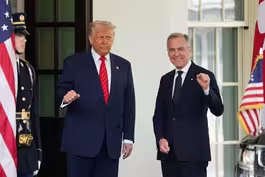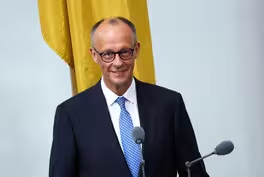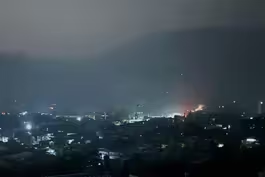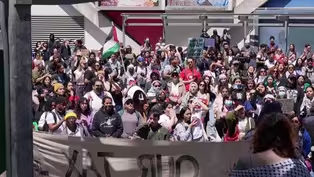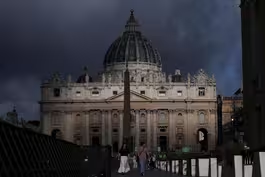
What's behind the major delays at Newark's airport
Clip: 5/6/2025 | 5m 52sVideo has Closed Captions
What's behind the major delays and cancellations at Newark's airport
Newark Airport continues to be marred by cancelled flights and delays. The problems are front and center after a technical failure caused widespread disruption last week. Air traffic controllers who were in the thick of it have taken leave to recover from "traumatic stress," compounding a massive staffing shortage. Geoff Bennett discussed more with aviation correspondent Miles O'Brien.
Problems playing video? | Closed Captioning Feedback
Problems playing video? | Closed Captioning Feedback
Major corporate funding for the PBS News Hour is provided by BDO, BNSF, Consumer Cellular, American Cruise Lines, and Raymond James. Funding for the PBS NewsHour Weekend is provided by...

What's behind the major delays at Newark's airport
Clip: 5/6/2025 | 5m 52sVideo has Closed Captions
Newark Airport continues to be marred by cancelled flights and delays. The problems are front and center after a technical failure caused widespread disruption last week. Air traffic controllers who were in the thick of it have taken leave to recover from "traumatic stress," compounding a massive staffing shortage. Geoff Bennett discussed more with aviation correspondent Miles O'Brien.
Problems playing video? | Closed Captioning Feedback
How to Watch PBS News Hour
PBS News Hour is available to stream on pbs.org and the free PBS App, available on iPhone, Apple TV, Android TV, Android smartphones, Amazon Fire TV, Amazon Fire Tablet, Roku, Samsung Smart TV, and Vizio.
Providing Support for PBS.org
Learn Moreabout PBS online sponsorshipGEOFF BENNETT: Newark Airport continues to be marred by hundreds of canceled flights and delays.
The FAA has put a ground delay process in place to ease traffic at the busy airport and says planes departing to Newark are being held up an average of two hours and 41 minutes.
The problems are front and center after a technical failure caused widespread disruption last week.
Air traffic controllers who were in the thick of it have now taken special leave to recover from what they say is traumatic stress, compounding what was already a massive staffing shortage.
Transportation Secretary Sean Duffy discussed the need for delays when he was on FOX yesterday.
SEAN DUFFY, U.S. Transportation Secretary: You want to make sure that people are safe, and so you just have less departures out of the airport until we feel comfortable and safe that the system isn't going to go down again.
GEOFF BENNETT: We asked Secretary Duffy to join us tonight, and his office declined.
To help clarify some of the latest, we're joined now by our aviation correspondent, Miles O'Brien.
So, Miles, walk us through the timeline of what transpired last week and why it's still causing delays this week.
MILES O'BRIEN: Well, Geoff, it really boils down to a perfect storm.
What you have at the root of it is a very antiquated system, which the FAA has now admitted, with some technology going back really to the '50s, copper wire, floppy disks, very old technology.
You have a chronic staffing problem among air traffic controllers.
And, at Newark, since the middle of April, they have had a major reconstruction, rebuilding project on one of their big runways.
All of that combined together prompted the FAA to try to augment its staffing by sending some controllers in some positions to Philadelphia.
That required a communication link, of course, with the radars and the VHF radios.
And when those systems did not work, some real trouble started to begin.
And that is what led to the cascade of effects that we're seeing right now.
GEOFF BENNETT: Well, to better understand this, let's talk about what happened last week when that United Airlines flight from Charleston, South Carolina, was approaching Newark Airport.
You have heard the audio.
Tell us what happened.
MILES O'BRIEN: Yes, if you can imagine an air traffic controller looking at their radar screen and it suddenly going blank and then getting on the radio, not being able to get the response of the pilots in the airline, aircraft at the other end, let's listen to the tension as this interaction occurs.
AIR TRAFFIC CONTROLLER: We lost our radar, and it's not working correctly.
Radar service terminates.
Squawk VFR.
Change approved.
If you want a Bravo clearance, you can just call the tower when you get closer.
We don't have a radar, so I don't know where you are.
PILOT: OK, I will wait for that frequency from you, OK?
AIR TRAFFIC CONTROLLER: OK, no.
The squawk VFR, look up the tower frequencies.
We don't have a radar, so I don't know where you are.
MILES O'BRIEN: Yes, as you mentioned, Geoff, a handful of air traffic controllers, subsequent to that, took leave because of the trauma they induced in that.
This is a highly stressful job on a good day, and this was not a good day.
GEOFF BENNETT: Well, to your point about the FAA acknowledging how antiquated the system is, tell us more about that and what is required to fix it.
MILES O'BRIEN: Money.
And this is something that FAA administrators for years have tried to champion, but there's never been a concerted effort to really come up with the money from Congress to change over the whole system in a wholesale way.
On top of that, there's a lot of tradition and politics involved.
If you start talking about consolidating air traffic control positions, using satellite systems as opposed to spinning radars, people get concerned about job losses.
So it's a complicated bureaucratic problem, but it also requires just the idea of making this a priority for improving the infrastructure of aviation in this country.
GEOFF BENNETT: With all of these incidents piling up, Miles, based on your conversations with folks in the industry, is it safe to fly right now?
MILES O'BRIEN: Well, safe is a relative term.
Is it safer than driving down the highway?
Yes.
But is it less safe than it was?
Yes.
The erosion of safety is objectively true here.
There's no question about it.
When you have aircraft approaching a busy aircraft airport like Newark and controllers unable to see them or communicate with them, there is an erosion of safety there.
GEOFF BENNETT: Less safe than it was.
OK.
In the time that remains, starting tomorrow, in order to fly domestically, people are going to have to show a Real ID.
For folks who don't have that, what should they expect?
MILES O'BRIEN: Well, it is probably going to be some challenges at the TSA lines.
Apparently, only about 70 percent of travelers, Americans, now have so-called Real IDs, an enhanced I.D.
card, which the federal government has required.
If you don't know, you can check with your State Department of motor vehicles or look at your license to see if there's some indication of that.
But if you have a passport or a passport card, and if you go to the Web site for the TSA, they will give you a list of the I.D.
that would be satisfactory if your driver's license won't suffice.
But please allow some extra time.
GEOFF BENNETT: Miles O'Brien, our thanks to you, as always.
We appreciate it.
MILES O'BRIEN: You're welcome, Geoff.
Carney shuts down Trump's threats to annex Canada
Video has Closed Captions
Clip: 5/6/2025 | 8m 5s | Carney shuts down Trump's threats to annex Canada, says tensions will take time to resolve (8m 5s)
The challenges Germany's new conservative chancellor faces
Video has Closed Captions
Clip: 5/6/2025 | 5m 18s | As Germany selects a new conservative chancellor, a look at the challenges he inherits (5m 18s)
India launches missile strikes into Pakistani territory
Video has Closed Captions
Clip: 5/6/2025 | 2m 21s | India strikes Pakistani territory in response to militant attack on tourists (2m 21s)
Rep. Malliotakis on breaking with GOP on Medicaid cuts
Video has Closed Captions
Clip: 5/6/2025 | 6m 4s | GOP Rep. Malliotakis on breaking with her party and taking a stand against Medicaid cuts (6m 4s)
Trump's college crackdown raises concerns about free speech
Video has Closed Captions
Clip: 5/6/2025 | 9m 39s | How Trump's college crackdown is raising concerns about free speech and academic freedom (9m 39s)
Understanding the conclave and the selection of a new pope
Video has Closed Captions
Clip: 5/6/2025 | 7m 24s | Understanding the conclave, the secretive process to choose a new pope (7m 24s)
Providing Support for PBS.org
Learn Moreabout PBS online sponsorship
- News and Public Affairs

FRONTLINE is investigative journalism that questions, explains and changes our world.

- News and Public Affairs

Amanpour and Company features conversations with leaders and decision makers.












Support for PBS provided by:
Major corporate funding for the PBS News Hour is provided by BDO, BNSF, Consumer Cellular, American Cruise Lines, and Raymond James. Funding for the PBS NewsHour Weekend is provided by...
